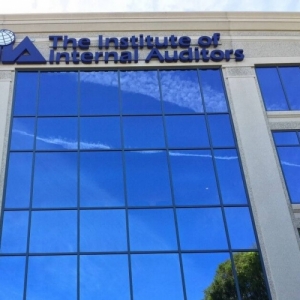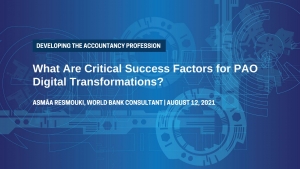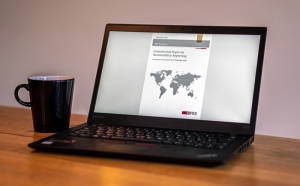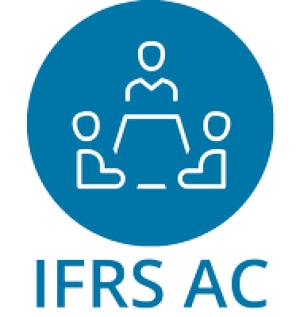عرض العناصر حسب علامة : الحوكمة
المدققون الداخليون يتجهون نحو السحابة
يعتزم ما يقرب من ربع فرق التدقيق الداخلي تنفيذ إدارة التدقيق المستندة إلى السحابة أو برامج الحوكمة والمخاطر والامتثال هذا العام، وفقًا لمسح جديد.
معلومات إضافية
-
المحتوى بالإنجليزية
Nearly a quarter of internal audit teams intend to implement cloud-based audit management or governance, risk and compliance software this year, according to a new survey.
The report, by the Institute of Internal Auditors’ Internal Audit Foundation and the audit, risk and compliance software developer AuditBoard, surveyed 134 internal audit leaders and found that 22 percent of the respondents indicated they intend to implement cloud-based technology this year, resulting in a majority of internal audit teams using a cloud-based audit management or GRC software for the first time.
The findings come as more auditors implement cloud-based technology, especially during the pandemic when many organizations have shifted much of their workforce to remote work from home arrangements. Hesitancy over adoption of cloud technology is giving way to practical necessity.
“While automation of administrative functions offers clear and immediate benefits, internal audit is discovering the technology’s potential to drive departmental and business value,” said IIA COO William Michalisin in a statement last month. “This survey shows a positive step forward, with 22 percent of respondents saying they plan to implement cloud-based technology this year. As this report suggests, technology doesn’t merely complement the internal audit function, it’s crucial to more effective practices, allowing us to focus where it matters most and to elevate our value to stakeholders.”
Managing Your Firm in a Post-COVID World
Think beyond the pandemic with exclusive resources to help you build a thriving virtual practice.
SPONSORED BY INTUIT ACCOUNTANTS
Plans for greater use of cloud technology indicates that internal audit departments are moving nearer to the cloud technology adoption rates of other business functions like the IT department. Internal auditors cited a number of challenges they encountered last year. A 52 percent majority of the respondents said identifying and evaluating new and emerging risks was their top challenge in 2020, while 43 percent cited the need to collaborate remotely with internal and external audit stakeholders. Communication and follow-up with business owners was considered a top concern by 38 percent of the internal auditors who responded to the survey.
The top uses for audit management software cited by the survey respondents were document management, issue and action plan management, and testing and work reviews. One respondent indicated that internal auditors have more time for strategic activities when their administrative activities are automated.
“Many internal audit teams that have not yet shifted to a cloud approach are now set to reap the benefits of modernization — including gaining greater bandwidth for strategic, value-add activities — and will be better positioned to protect their organizations from new and emerging risks,” said AuditBoard chief marketing officer John Reese in a statement. “They'll also get to equal footing with other functions within their organization who have already made the move to cloud-based solutions.”
The report points to some of the advantages of cloud-based solutions compared to other technologies in that they are often more secure than manual solutions and are easier to implement and administer than on-premise systems. Cloud-based systems are typically offered as a service, reducing the cost of maintenance and offering increasing value over time, as new features and improvements are added to benefit older and newer customers. Cloud-based investments are considered operational expenses, which are often favored by CFOs and may have a streamlined purchase process compared to on-premise investments, which are considered capital expenses, often subject to extra scrutiny. When choosing which approach to take, chief audit executives should familiarize themselves with the organization’s operational expense and capital expense approval processes, the report advises.
Separately, former IIA president and CEO Richard Chambers, who recently left the IIA after running the organization for 12 years, has joined the board of SWAP Internal Audit Services, a company in the U.K., as its first independent non-executive director, starting April 1. He also recently formed his own firm, Richard F. Chambers and Associates LLC, with the mission of informing and inspiring internal auditors and illuminating the potential of the profession globally.
ما هي عوامل النجاح الحاسمة للتحولات الرقمية لمنظمات المحاسبة المهنية؟
تقدم أسماء الرسموقي مستشار البنك الدولي 5 ركائز أساسية يجب أن تضعها منظمات المحاسبة المهنية لإحراز تقدم ناجح في التحول الرقمي.
معلومات إضافية
-
المحتوى بالإنجليزية
What Are Critical Success Factors for PAO Digital Transformations?
ASMÂA RESMOUKI, WORLD BANK CONSULTANT | AUGUST 12, 2021
There is a significant opportunity for Professional Accountancy Organizations (PAOs) to accelerate digital transformation to improve the delivery of their mandate. This was evident through a recent World Bank project that engaged with Board members and senior management of 20 PAOs in Sub-Saharan Africa, Middle East & North Africa (MENA), Latin America, and the Caribbean regions regarding their digital transformation journeys.
“We need to accelerate adoption of digital transformation to enhance services to our members and public”
“We need to design a digital transformation strategy supported by financial and human resources to leapfrog our service offering during the COVID 19 period”
“Digital transformation will assist us to support prospective accountants in rural areas”.
These were some of the sentiments that were expressed by Board members, and by speakers and participants during the knowledge event hosted by IFAC and the World Bank on PAO digital transformation (available in English and French).
Based on the conversations, the following are 5 key pillars that PAOs should put in place to successfully progress their digital transformation.
1. Governance: Tone at the top should set direction
Throughout the project, it was noticeable that when the PAO President and Board members had a clear vision and were committed to the digital transformation reform, there was commendable and concrete progress. The opposite was also true: i.e., minimal digital transformation among PAOs where leadership did not show enough enthusiasm for the reform or consider it a priority. Therefore, it is important for the Board to take the leading role in setting direction and really driving the necessary changes.
2. Design and implement a user-centric digital transformation strategy
Digital transformation requires a clearly articulated strategy that defines strategic objectives, implementation plans, and performance targets with timelines (Key Performance Indicators).
When designing the strategy, the Board should engage with the membership and all relevant stakeholders to ensure their needs and expectations are incorporated. The final strategy should then be shared and communicated with them. Subsequently, the PAO leadership should regularly request feedback from members and stakeholders on any new digital tools and request suggestions to improve the user-experience. This would create a virtuous circle between the PAO and its stakeholders.
Ideally, the digital strategy should be linked to the overall strategy of the PAO, since digitalization serves as a tool to execute the overall strategy. The Ordre National des Experts Comptables et des Comptables Agréés du Burkina Faso is a good example of a small PAO which has designed its digital transformation strategy using guidance from IFAC’s Information and Communications Technology (ICT) Guide.
3. Be connected and benefit from the country digital economy eco-system
PAOs should be aware of digital transformation reforms in their country and maintain close working relationships with the governmental departments and officials driving the reform. Government reforms seem to be focused on strengthening national infrastructure to improve access and reduce cost, enhancing digital skills, offering digital public and business platforms to accelerate the use of e-services, and strengthening digital enablers like cybersecurity and data protection. These initiatives can have a direct impact on PAOs’ digitalizlation initiatives.
Therefore, it is crucial for PAOs to follow and engage with the right stakeholders regarding national digital transformation reforms to determine they can benefit from such a reform and related activities. This could include empowering their members with greater digital skills by including technology skills in the accounting qualification curriculum and offering regular digital courses in the CPD program.
4. Adequate human and financial resources
Without dedicated human and financial resources, it is a challenge to implement a successful digital transformation reform. This does not necessarily mean having massive and seemingly unlimited resources. It means making smart investments now for better returns and savings in the future. Therefore, PAOs might need to be creative in securing the financial and human resources required to implement their digital transformation strategy.
Securing funding could mean re-prioritizing the available budget to focus on digitalization activities which will add value to members and save costs in future, requesting members to contribute to a special fund for the reform, securing sponsorship, and/or applying for government funding or donor funding, etc.
For example, the Ordre des Experts-Comptables de Côte d’Ivoire partnered with the national tax authority to support taxpayers in filing their financial statements on an online platform. Whenever a member does an online filing, a specific fee is submitted to the PAO, in turn, creating a new alternative revenue stream.
Human resources are also essential. Depending on the financial resources available, PAOs could either designate someone from their secretariat to lead the initiative, engage a consultant, outsource the function or set up a special Digital Transformation Committee with a clear terms of reference.
5. Partnering with others
PAOs should explore partnerships and leverage their IFAC membership and IFAC’s Network Partners. Such partnerships would enable them to benefit from global and regional resources and knowledge-sharing opportunities.
Similarly, PAOs should partner with other PAOs, especially those who have progressed with digitalization reforms already. Such PAOs can serve as mentors: sharing experiences on how they have walked the transformation journey, provide advice and guidance on when and where to purchase new softwares or technologies, and/or provide input to a PAO that is developing its digital strategy, etc. PAOs are encouraged to raise their hands and seek help and support whenever needed.
In closing, while the level of progress varies from PAO to PAO, the challenges for smaller PAOs oftentimes remain greater given their limited resources. Yet, “small streams make big rivers” — starting with small actions and building on them with regularity and consistency should allow PAOs to be successful in achieving their digital transformation goals. All PAOs are invited to consider the above pillars to start or accelerate their digital transformation to efficiently and effectively deliver on their mandates.
كي بي ام جي KPMG توسع الخدمات البيئية والاجتماعية والحوكمة
تعمل KPMG على زيادة جهودها لتوفير الخدمات البيئية والاجتماعية والحوكمة للعملاء من خلال مبادرة جديدة تسمى KPMG Impact.
معلومات إضافية
-
المحتوى بالإنجليزية
KPMG has been increasing its efforts to provide environmental, social and governance services to clients through a new initiative called KPMG Impact.
The team will help clients improve their ESG performance while also carrying out KPMG’s own ESG commitments. Last year, KPMG U.S. worked with other businesses, investors, standard-setters, non-governmental organizations and international organizations through the World Economic Forum to create a set of 21 core metrics for companies to disclose their progress in the ESG areas of people, planet, prosperity and governance. KPMG has adopted those same metrics to guide its actions and measure and report its progress.
The move comes as more accounting firms wade into providing ESG reporting and assurance services for clients. ESG funds have become a popular vehicle for investors, and the Securities and Exchange Commission is weighing requirements for climate risk disclosures by companies. At the same time, at the global level, securities regulators around the world are pushing for greater consistency in reporting ESG metrics, encouraging standard-setters to align their various standards and frameworks more closely together. The International Financial Reporting Standards Foundation has been working on creating a proposed International Sustainability Standards Board that it would oversee alongside the International Accounting Standards Board. IFRS Foundation trustees explained how the structure would work during a webinar Wednesday.
Using Too Many Systems? Accounting Practice Management all in One Place
Canopy is a full-suite practice management software for accounting firms offering client management, document management, workflow, and time and billing...
SPONSOR CONTENT FROM CANOPY
This move toward greater sustainability reporting and assurance is one that KPMG has already been working on for years, but it’s taken on greater urgency as climate change risks appear to have grown with rising temperatures seen in the U.S. and across the globe.
The offices of KPMG in ChicagoTANNEN MAURY`/BLOOMBERG NEWS
“At the highest level for us, the backdrop for the rise of ESG is it’s all about trust,” said KPMG Impact leader Rob Fisher. “You see people looking to business as an ethical and effective leader to bring ESG aspirations to life, and the recent decline in trust that we see across institutions like government and media and so on affects our ability to come together and solve problems. That’s why a focus on organizations doing well across environmental, social and governance dimensions can really build trust with customers, employees, investors, regulators and really all stakeholders. We think ESG engagement will make businesses better by unlocking new value, building resilience and driving profitable and measurable growth both today and tomorrow.”
He has been working with clients on taking individual approaches to ESG reporting. “As I think about specific client conversations that I’m having, it’s that every business across all industries is on a unique ESG journey that reflects its stakeholders, challenges and opportunities,” said Fisher. “Effective engagement really has to be embedded throughout a company’s entire strategy and operations. Many of the clients we are working with are actually the leaders in their industries in areas like climate, the environment, social justice and so on, but they’re still looking for our help in how they bring it all together and figuring out the opportunities to improve.”
ESG encompasses not only the environment, but also social initiatives like diversity, equity and inclusion, and the firm is helping clients with those efforts as well. That includes providing assurance services.
“There are four big buckets of work that we’re doing for clients,” said Fisher. “One, we’re helping clients develop a broader ESG strategy, and then the second part is how do you operationalize that strategy. We’re seeing a lot of interesting opportunities around transformational opportunities and the ability to create some value, and we’re really seeing financial institutions and private equity leaning in because of that. There’s a ton of investor demand in that regard. The fourth bucket is around helping companies figure out how to measure it, report it, and assure it. Certainly there are a number of different standards and different frameworks and metrics for reporting ESG data, and we’re really working with clients to help them understand, based on perhaps the specific interests of particular investors or the industry that they’re in, what frameworks are going to make the most sense to help them develop capabilities to measure their return on their ESG [efforts]. You want it to be accurate and fit for purpose disclosure type of reporting.”
Last month, KPMG submitted a comment letter to the SEC in response to the SEC’s request for public input on climate change disclosures. “Ours is really about a building block approach at a high level,” said Fisher. “We support a global baseline. Then there would be supplemental standards to serve specific jurisdictional needs. I think the importance of some sort of consistency at the global level is that, if we don’t have that, disclosures will be less consistent and comparable. Registrants are operating across multiple jurisdictions and their supply chains and their customer base are certainly going to be global. We really think it has to start with a baseline and then additional disclosures that would be necessary in the context of the U.S.”
Becker Professional Education has been seeing growing demand for its Continuing Professional Education courses on ESG, with Tim Gearty, national director and editor-in-chief at Becker, conducting 40 to 50 sessions per month on ESG for companies across industries.
“Europe seems to be taking the lead on this,” said Gearty. “We in the United States are catching up quickly, but the European Union clearly took the lead on this, and they’re pushing ahead. We’re still in a catchup mode, but we have a lot of great thought leaders that are working very diligently to make sure that our standards are ultimately measurable and that assurance can be given to them. One of the critical items is we have to be able to measure those standards both qualitatively and quantitatively before assurance can be given.”
Groups like the American Institute of CPAs, the Institute of Management Accountants, the International Federation of Accountants, and the Association of Chartered Certified Accountants have been encouraging members to get involved in ESG reporting. The ACCA published a new report Wednesday, “Rethinking Risk for the Future,” examining the role of the accounting profession in effective risk management amid the crises presented by climate change, the COVID-19 pandemic, and the resulting economic turbulence. The report discusses how accountants can help organizations not only detect and better understand the emerging risks and opportunities facing them, but also cultivate the mindsets needed to think in more of a long-term perspective.
The IFRS Foundation is aiming to establish the proposed International Sustainability Standards Board by November in time for the United Nations COP26 Climate Change Conference in Scotland, after recently receiving endorsements from the G-7 finance ministers and the International Organization of Securities Commissions. “There is a timeline we are working toward,” said IFRS Foundation vice-chair Larry Leva during Wednesday’s webinar. “There are now less than four months until the COP26 conference in November. ... We still have a tremendous amount of work ahead of us, but we remain on track to make a final decision in advance of the COP26 meeting in Glasgow. We have received a great deal of support and goodwill for this work, and there is a real determination to make this happen.”
“This is an area that our profession is best positioned to be working, whether it’s internally reporting on it or working externally to give assurance on it,” said Gearty. “We’re understanding the demand because the demand for ESG is coming from the SEC, national business councils, the World Economic Forum, the AICPA, the Global Reporting Initiative, the European Union, and of course asset managers for these funds. They’re all demanding standards, so whether it’s a sustainability fund or just a report that’s being issued by a company, they can be ultimately verifiable so the individuals in the public can rest assured that the information is accurate and not manipulated.”
دعوة للمتحدثين لمؤتمر IIA الدولي لعام 2022
دعوة مقدمي العروض الديناميكيين لمشاركة أفكارهم وأدواتهم ومواردهم مع المدققين الداخليين من جميع أنحاء العالم في مؤتمر IIA الدولي لعام 2022، الذي سيعقد في 17-20 يوليو في شيكاغو. أرسل قبل 22 أغسطس 2021.
معلومات إضافية
-
المحتوى بالإنجليزية
Call for Speakers
2022 International Conference
July 17–20
McCormick Place Convention Center, Chicago
Submission Deadline: August 22, 2021, 11:59 p.m. ET
Overview
This document has been developed as a guide for proposal submissions for the 2022 International Conference. We encourage all potential speakers to review this document prior to submitting a proposal for consideration.
The theme for The IIA’s 2022 International Conference sets the stage to share new and forward-looking information and leading practices in the pursuit of excellence in internal audit. As internal auditors are increasingly becoming trusted advisors and an integral part of their organizations, they are compelled to broaden their arsenal of skills. This conference will prepare industry professionals to embrace and learn new technologies, and implement new tools and techniques to effectively respond to shifting business and risk landscapes. The goal is to equip the profession with the resources it needs to stay current with the latest developments and advancements to bring significant value to businesses around the world.
We seek dynamic presenters who can engage their audience and conduct thought-provoking discussions. You are encouraged to participate by submitting a proposal to speak, noting the topic on which you would like to present within the education formats noted below.
Topics of interest for the conference include:
كيف تساعد الرؤية والاستراتيجية الشركات الصغيرة على النجاح
تبدأ العديد من الشركات حياتها بفكرة رائعة ولكنها تكافح لكي تصل الى العالمية ولذلك نقدم لك المكونات الرئيسية التي تستطيع ان تبني منظمة قوية داخلياً وخارجياً.
دراسة ماجستير: تقييم مدى اهتمام مؤسسات المراجعة الخارجية بالسودان بأبعاد حوكمة مهنة المراجعة
هدفت هذه الدراسة إلى التعرف على مدى اهتمام مؤسسات المراجعة الخارجیة بتطبیق أبعاد حوکمة مهنة المراجعة فی الواقع العملی لبیئة الممارسة المهنیة للمراجعة الخارجیة بالسودان
إنفوجرافيك.. أربعة أخطاء شائعة يجب تجنبها عند اختيار إدارة الشركاء
الخطوات التالية لأمناء مؤسسة المعايير الدولية لإعداد التقارير المالية استجابة للطلب على معايير الاستدامة العالمية
يعلن أمناء مؤسسة المعايير الدولية لإعداد التقارير المالية (IFRS) عن الخطوات التالية استجابة للطلب المتزايد لمعايير الاستدامة العالمية
معلومات إضافية
-
المحتوى بالإنجليزية
02 February 2021
IFRS Foundation Trustees announce next steps in response to broad demand for global sustainability standards
The Trustees of the IFRS Foundation met on 1 February 2021 to review responses to the first three questions asked by their consultation paper on sustainability reporting—demand for global sustainability standards, whether the IFRS Foundation should play a role, and, if so, the requirements for success in doing so. The responses indicate growing and urgent demand to improve the global consistency and comparability in sustainability reporting, as well as strong recognition that urgent steps need to be taken and broad demand for the IFRS Foundation to play a role in this.
Given this demand, the Trustees have agreed to undertake further detailed analysis of feedback on the requirements for success and other conditions to be satisfied prior to consideration of whether to establish a new board. The Trustees agreed the formation of a Trustee Steering Committee to oversee the next phases of work and added an additional key requirement for success—being the need for urgency to deliver global standards, most notably on climate.
Throughout the three-month consultation period, the Trustees led comprehensive outreach programmes within their respective jurisdictions to inform their decision-making and to encourage broad participation across all geographies and stakeholder groups. This included more than 400 engagements across 33 jurisdictions, participation in more than 20 public events hosted by third parties and the hosting of webinars that attracted more than 3,000 registered users. Following that outreach, the IFRS Foundation received 576 comment letters from a diverse set of organisations and individuals from around the world. All responses to the consultation paper are publicly available.
The Trustees will be meeting next on 2-4 March 2021. Given the growing and urgent demand, the intention would be for the Trustees to produce a definitive proposal (including a road map with timeline) by the end of September 2021, and possibly leading to an announcement on the establishment of a sustainability standards board at the meeting of the United Nations Climate Change Conference COP26 in November 2021.
Further information is available from the sustainability reporting project page.
هل الانكار نهر في مصر أم هو حالة مؤسستك؟
معلومات إضافية
-
المحتوى بالإنجليزية
Is denial a river in Egypt or the state of your firm?
By Dom Esposito
We all know that denial is not a river in Egypt, but how many of us know that denial is the state of our firm?
In his 2008 book entitled “Strategy and the Fat Smoker,” David Maister wrote that we often (or even usually) know what we should be doing in both our personal and professional life. We also know why we should be doing it and (often) how to do it. Figuring all that out is not too difficult. What is very difficult is actually doing what you know to be good for you in the long run, despite short-run temptations. Therefore, many leaders, and by extension many small and midsized CPA firms, live in denial.
More often than not, what needs to be done by a firm’s managing partner or CEO is obvious. While it’s not always easy, he or she needs to make those tough decisions in the best interests of the firm. But many leaders are in denial and fall short of what’s required, and, in many cases, that’s the principal reason why so many firms can’t get to the next level or, worse yet, can’t perpetuate themselves.
Managing Your Firm in a Post-COVID World
Think beyond the pandemic with exclusive resources to help you build a thriving virtual practice.
SPONSORED BY INTUIT ACCOUNTANTS
Presented below are the obvious but not easy things that a managing partner needs to do in today’s world of public accounting to be viewed as an effective leader who sits on top of a firm that is not in denial:
Walk and talk the vision, mission and strategy of the firm. Lead by example. “Do as I do, not as I say.”
Create an environment that breeds trust, persistency and consistency.
Shepherd senior partners and potential all-stars.
Create a firm-first (our clients vs. my clients) culture.
Be open to service diversification. Move away from the traditional accounting firm model to a professional services firm model.
Address ineffective partners on a timely basis.
Realize that size (with quality and profits) matters, and explore a business combination or two if that is in the long-term best interests of clients, staff and partners.
Deliver on the client promise of being a trusted advisor.
Create goal setting, accountability and discipline — first and foremost with the partners and then with the staff.
Drive industry specialization, the undisputed vehicle to provide client distinctiveness and value.
Implement a partner compensation plan that is fair and equitable, incentivizes high performers and potential all-stars, and avoids “sprinkles.”
Get value from non-billable time.
Create a balanced approach to partner and staff utilization that’s neither too lenient nor too overbearing.
Insist that a strategic plan may require a “no” when an idea doesn’t conform.
Develop an effective “farm system” for talent, particularly future partners.
Avoid being too many things to too many sectors.
Gain market permission from the gatekeepers such as investment bankers, attorneys and bankers who will enable you to move upstream with clients.
Grow for strategic purposes not simply for volume.
Require the proper mix of clients, marquee clients (credential builders) and other clients that help pay the rent and train the staff.
Have corporate governance and operating models that work for the overall firm.
Always have the desire (and ability) to invest in the future.
Help partners and staff realize that quality work doesn’t necessarily mean quality service.
From a quick review of the above, it’s clear that a managing partner is the heart and soul of a CPA firm, the one who must do what needs to be done to avoid denial and to ensure success. Having said that, many firms do not have effective managing partners. Here are four common mistakes to avoid when selecting managing partners:
1. Don’t ask the firm’s No. 1 biller to be managing partner.
While a successful managing partner usually carries a small client load to stay grounded in client service and to remain credible with the partner group, billings and chargeable hours are truly a small part of the job. In my view, a managing partner’s clients are the partners, giving them the opportunity to maximize their strengths while minimizing their weaknesses. A managing partner has to be readily available for big opportunities or problems.
2. Think long and hard before you ask someone from the outside to be managing partner.
Without a lot of due diligence and partner buy-in, an “outsider” is too risky, particularly if someone comes from outside the professional services firm environment. An outsider obviously doesn’t know the firm’s history or culture or the partners’ individual strengths and weaknesses. An outsider also isn’t attached to the firm’s vision, mission and strategy. Please stay away.
3. Don’t ask two partners to function as co-managing partners.
In the spirit of political correctness, it’s not unusual for firms to select co-managing partners. It’s a safe decision that doesn’t offend quality partners who compete for the position.
While from time to time, this kind of arrangement can work, many times it doesn’t and is therefore a step that should be taken with lots of caution. Too often firms with co-managing partners are plagued with inaction or conflicting directions with little, if any, consistency on strategy. If co-managing partners can be avoided, take the bold step and the tough decision: select the right person for the job today and make sure you do your best to retain the other contenders.
4. Don’t ask a part-time committee to be managing partner.
Firms can’t operate by part-time committees. A firm needs to make decisions and move on. Sure, a firm needs oversight committees such as a management committee or an operations committee to drive their day-to-day activities. A firm also needs an executive committee for corporate governance, partner matters and strategy. But a firm can’t easily do what is obvious if the key leadership role is delegated to a part-time committee that reacts to situations if and when time permits. It’s a recipe for disaster. No one is thinking about strategy and the future while, at the same time, making sure that the necessary blocking and tackling are being tended to.
So, why do some firms continue to live in denial and lack an effective managing partner? In many cases, it comes down to trust and security.
Many firms select a new managing partner from their ranks at an age somewhere between 45 and 53. Candidates are usually excellent client relationship partners with substantial client service responsibilities. The thought of giving up a substantial portion, if not all, of the client relationships that have been developed over years of service is scary to many. For sure, there is a risk in being a managing partner. Candidates may ask, “What happens if I’m not successful? In the spirit of trust, I lose most, if not all, of my client responsibilities and begin to lose touch with my outside referral sources. I’ll have nowhere to go but to exit the firm when I’m no longer the managing partner.”
This is a very real concern and many firms do not want to recognize the severity of the issue. Instead, firms say, “trust us,” and while that’s easy to say, history has shown that this trust has sometimes been misplaced. As a result, for the overall good and welfare of a firm, I recommend that a managing partner be offered an agreement that addresses what happens if he or she is no longer the leader of the firm. Such an agreement can address what happens to future compensation, what happens to employment, and what happens to retirement benefits or deferred compensation arrangements. It can pay huge dividends down the road for everyone.
تعيين جديد في المجلس الاستشاري للمعايير الدولية لإعداد التقارير المالية
معلومات إضافية
-
المحتوى بالإنجليزية
13 January 2021
IFRS Foundation Trustees announce appointment of Xianzhong Li to the IFRS Advisory Council
The Trustees of the IFRS Foundation, responsible for the oversight and governance of the International Accounting Standards Board (Board), have confirmed the appointment of Xianzhong Li to the IFRS Advisory Council, effective 1 January 2021 and for a three-year period.
Mr Li takes over the Advisory Council seat from Yibin Gao and will represent the Chinese Ministry of Finance, where he is currently the director-general of the Accounting Regulatory Department.
The Advisory Council advises the IFRS Foundation Trustees and the Board on strategic matters and it consists of representatives from over 50 groups affected by and interested in international financial reporting, including academics, analysts, auditors, investors, preparers, professional accounting bodies, regulators and standard-setters.










